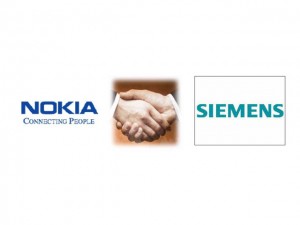COPENHAGEN/MUNICH: A six-year pact binding Siemens and Nokia in Nokia Siemens Networks expired on Thursday with sources at the two parent companies saying there was no sale in sight for at least the next few months.
The lapsing of the shareholder pact frees the co-parents to sell all or part of their 50 percent stakes in NSN without consulting the other. Some financial analysts who specialise in the technology sector had said a deal could be possible as early as this month after Siemens executives set up an exploratory committee earlier this year.
Sources at both Siemens and the Finnish handset maker said no deals – including a stock exchange listing or buyout – were imminent, however.
German industrial bellwether Siemens has been more outspoken than Nokia about its desire to sell its stake in the joint venture to focus on its core business. It booked a 741 million-euro equity investment loss at NSN last year.
Nokia has also made no secret of wanting to let go of NSN so it can concentrate on its ailing mobile phone business. It recently cancelled dividends and sold, then leased back, its company headquarters to save cash.
More time needed for IPO
Taking NSN public was “the ideal solution,” said one banker who has been involved in technology sector deals, declining to be named as he was not authorised to speak on the matter.
Such a move would have been unthinkable a year ago as competition from Chinese rivals such as Huawei hit its margins and a weak global economy discouraged dampened spending on telecommunications equipment.
After a massive restructuring drive including staff cuts and asset sales, NSN’s operating and gross margins have risen in recent quarters. By the end of 2012 it was contributing to Nokia’s cash flow instead of draining it, and Nokia said NSN was making “progress towards becoming a more independent entity.”
In interviews with Reuters and in research reports, most financial analysts who specialise in the sector said that investors would want to see a few more quarters of improvement before buying NSN shares, however. Most pin NSN’s value at around 6 to 10 billion euros.
Canaccord Genuity analyst Michael Walkley cut his price target on Nokia this week on worries Samsung was eating into its mobile market share, but he was upbeat about NSN. He estimated its value at around 8.9 billion euros, 0.55 times expected sales for 2013. Morgan Stanley has said it sees NSN’s value at 0.4-0.6 times 2013 sales.
He noted NSN was becoming a leading supplier of Long Term Evolution (LTE) high speed data devices after winning contracts with carriers upgrading their mobile internet infrastructure, particularly in North America but also Japan and Korea.
“On a macro level, the market’s only going to support three mobile broadband players. And we think it will be Ericsson, Huawei and the third one will be Nokia Siemens, given their execution,” Walkley told Reuters.
But he said an initial public offering would take time. “They’re still going through restructuring,” he said. “It may take another two to three quarters to show… it’s a sustainably profitable company.”
Sale to private equity or rival
Other possible scenarios include selling to private equity. Such firms shunned NSN when the co-parents tried unsuccessfully to sell it in 2011, but NSN’s turnaround could attract interest.
The analysts said that a buyout by an industry rival was also possible, although few were willing to name potential buyers other than Alcatel-Lucent. European governments were likely to oppose Chinese manufacturers over security concerns.
Some said a combination of Alcatel-Lucent and NSN could help fight off stiff competition from the Chinese players as well as Sweden’s Ericsson.
Alcatel-Lucent has its own cash burn problems, however, and new chief executive Michel Combes has been tasked with implementing decisive job cuts. In 2012, the firm posted a 1.4 billion euro net loss.
“It’s unlikely that Alcatel will be interested,” said a banker who has worked with Alcatel, who asked not to be named because he was not authorised to comment.
Some financial analysts said Nokia, possibly in partnership with another investor such as private equity or Finland’s state investment fund Solidium, could take a minority stake in a sale or IPO and continue to benefit from NSN’s growth.
Morgan Stanley analyst Francois Meunier said it would be preferable for both Siemens and Nokia to make a “clean” exit, but said that if Nokia’s mobile phone business continues bleeding cash, a sale could make its financial results look even weaker.





